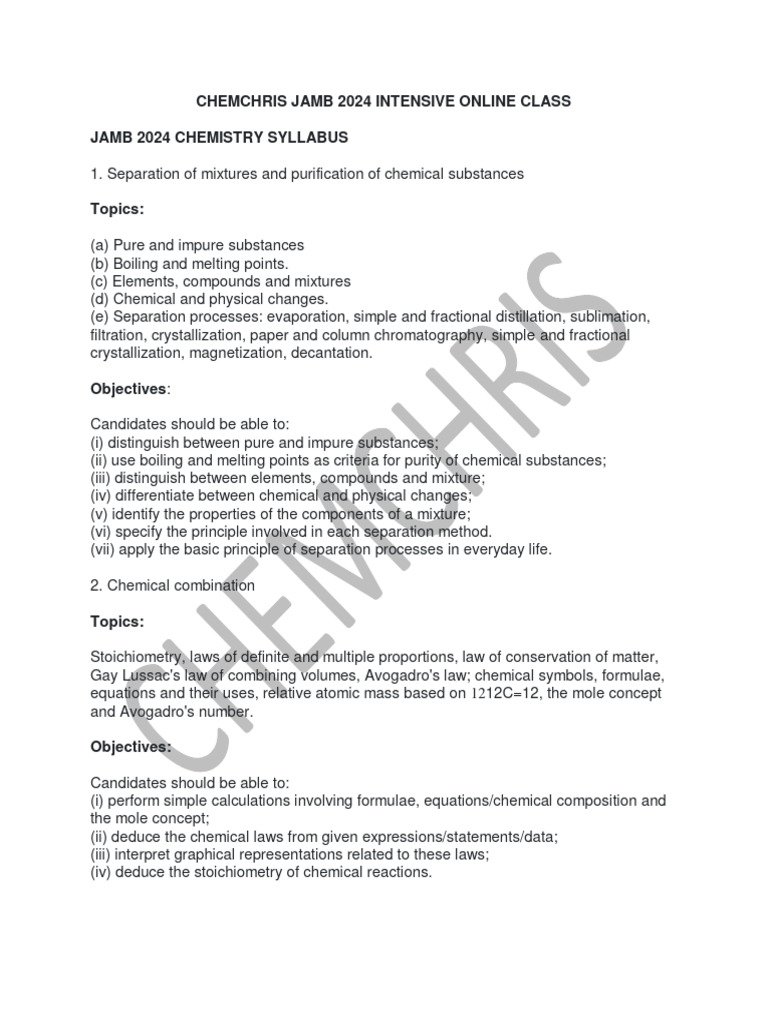
Looking for the Chemistry JAMB Syllabus for 2024? You’re in the right place. The JAMB Chemistry syllabus for 2024 is here to guide you through the key topics and concepts you need to know to excel in your upcoming exams. Understanding the syllabus is crucial for effective preparation and success. Let’s dive into the details to ensure you are fully equipped to tackle the Chemistry section of the JAMB exam with confidence.
Exploring the Chemistry JAMB Syllabus 2024
Welcome, future science enthusiasts! Today, we delve into the exciting world of chemistry as we explore the Chemistry JAMB Syllabus for the year 2024. Whether you are preparing for the Joint Admissions and Matriculation Board (JAMB) examination or simply curious about the wonders of chemistry, this comprehensive guide will equip you with the knowledge and skills needed to ace the exam with confidence.
The Importance of Chemistry
Chemistry is the study of matter, its properties, composition, structure, and the changes it undergoes. From the air we breathe to the food we eat, chemistry is present in every aspect of our daily lives. Understanding the principles of chemistry not only helps us make sense of the world around us but also opens up a world of possibilities in various scientific fields.
Overview of the Chemistry JAMB Syllabus
The Chemistry JAMB Syllabus for 2024 is designed to cover a wide range of topics that are fundamental to the study of chemistry. These topics are divided into various units, each focusing on different aspects of the subject. By mastering the concepts outlined in the syllabus, you will be well-prepared to tackle any question that comes your way in the JAMB examination.
Units Covered in the Chemistry JAMB Syllabus 2024
1. General Chemistry
2. Organic Chemistry
3. Inorganic Chemistry
4. Physical Chemistry
General Chemistry
General Chemistry forms the foundation of the subject and covers topics such as atomic structure, chemical bonding, states of matter, solutions, and more. Understanding these basic principles is essential for building a strong grasp of chemistry.
Key Topics in General Chemistry
1. Atomic Structure: Learn about the structure of atoms, subatomic particles, and the periodic table of elements.
2. Chemical Bonding: Explore the different types of chemical bonds, such as ionic, covalent, and metallic bonds.
3. States of Matter: Understand the properties and behavior of solids, liquids, and gases.
4. Solutions: Study the characteristics of solutions, solubility, concentration units, and colligative properties.
Organic Chemistry
Organic Chemistry focuses on the study of compounds containing carbon, which form the basis of all living organisms. This unit covers topics such as hydrocarbons, functional groups, isomerism, and reactions of organic compounds.
Key Topics in Organic Chemistry
1. Hydrocarbons: Learn about the different types of hydrocarbons, including alkanes, alkenes, and alkynes.
2. Functional Groups: Understand the role of functional groups in organic molecules and their impact on chemical properties.
3. Isomerism: Explore the concept of isomerism and the different types, such as structural isomerism and stereoisomerism.
4. Reactions of Organic Compounds: Study the reactions of organic compounds, including addition, elimination, substitution, and oxidation-reduction reactions.
Inorganic Chemistry
Inorganic Chemistry deals with the study of inorganic compounds that do not contain carbon-hydrogen bonds. This unit covers topics such as the periodic table, coordination compounds, metallurgy, and the chemistry of selected metals.
Key Topics in Inorganic Chemistry
1. Periodic Table: Understand the organization of elements in the periodic table, trends in properties, and chemical reactivity.
2. Coordination Compounds: Learn about the structure and bonding in coordination compounds, including ligands and coordination numbers.
3. Metallurgy: Explore the extraction of metals from their ores and the properties of metals.
4. Chemistry of Selected Metals: Study the properties, uses, and reactions of selected metals such as iron, copper, and aluminum.
Physical Chemistry
Physical Chemistry focuses on the application of physical principles to chemical systems, including topics such as chemical kinetics, thermodynamics, electrochemistry, and quantum chemistry.
Key Topics in Physical Chemistry
1. Chemical Kinetics: Study the rates of chemical reactions, factors affecting reaction rates, and rate laws.
2. Thermodynamics: Explore the laws of thermodynamics, entropy, enthalpy, and spontaneous processes.
3. Electrochemistry: Understand the principles of electrochemical cells, oxidation-reduction reactions, and electrochemical cells.
4. Quantum Chemistry: Learn about the quantum mechanical model of the atom, electron configurations, and molecular orbital theory.
Preparing for the Chemistry JAMB Examination
To excel in the Chemistry JAMB examination, it is essential to develop a solid understanding of the key concepts outlined in the syllabus. Here are some tips to help you prepare effectively:
1. Study Regularly
Consistent studying is key to mastering the concepts of chemistry. Set aside dedicated time each day to review your notes, practice problems, and seek clarification on any challenging topics.
2. Practice Past Questions
Practice makes perfect! Familiarize yourself with the types of questions asked in previous JAMB examinations to get a sense of the exam format and the areas where you need to focus your attention.
3. Seek Help When Needed
Don’t hesitate to reach out to your teachers, peers, or online resources for help. Chemistry can be a complex subject, and it’s okay to seek clarification or guidance when you encounter difficulties.
4. Stay Positive and Confident
Believe in yourself and your abilities. Stay positive, maintain a growth mindset, and approach the exam with confidence. Remember, you’ve put in the hard work, and you are well-prepared to succeed!
In conclusion, the Chemistry JAMB Syllabus for 2024 covers a wide range of topics that are essential for a comprehensive understanding of the subject. By familiarizing yourself with the key concepts outlined in the syllabus and adopting effective study strategies, you can approach the JAMB examination with confidence and excel in your performance. Remember, chemistry is a fascinating field that holds the key to unlocking the mysteries of the world around us. So, embrace the journey of learning and discovery, and let your passion for chemistry shine bright!
CHEMISTRY SYLLABLES JAMB 2024
Frequently Asked Questions
What are the key topics covered in the Chemistry JAMB syllabus for 2024?
The Chemistry JAMB syllabus for 2024 includes important topics such as atomic structure, chemical bonding, organic chemistry, physical chemistry, inorganic chemistry, environmental chemistry, and analytical chemistry.
How can students effectively prepare for the Chemistry section of the JAMB exam based on the 2024 syllabus?
Students can prepare for the Chemistry section of the JAMB exam by thoroughly understanding the concepts outlined in the syllabus, practicing past questions, utilizing textbooks and study guides, attending tutorials or classes, and actively engaging in practical experiments to reinforce their learning.
What is the significance of studying environmental chemistry as part of the Chemistry JAMB syllabus for 2024?
Studying environmental chemistry is crucial as it helps students understand the impact of human activities on the environment, pollution control measures, sustainable practices, and the role of chemistry in addressing global environmental issues. This knowledge is relevant not just for exams but also for fostering a mindset of environmental responsibility.
Final Thoughts
In conclusion, mastering the Chemistry JAMB Syllabus 2024 is crucial for success in the upcoming exam. Students must familiarize themselves with all topics outlined in the syllabus to excel. Stay focused on key concepts like organic chemistry, electrochemistry, and atomic structure to boost your scores. Make sure to practice past questions aligned with the Chemistry JAMB Syllabus 2024 to enhance your preparation and confidence.






